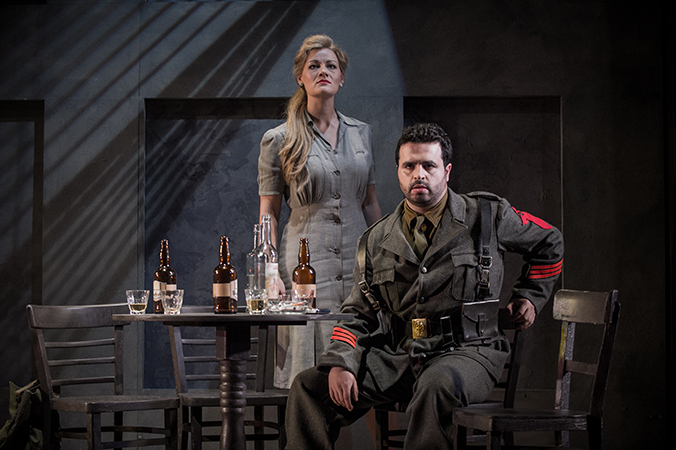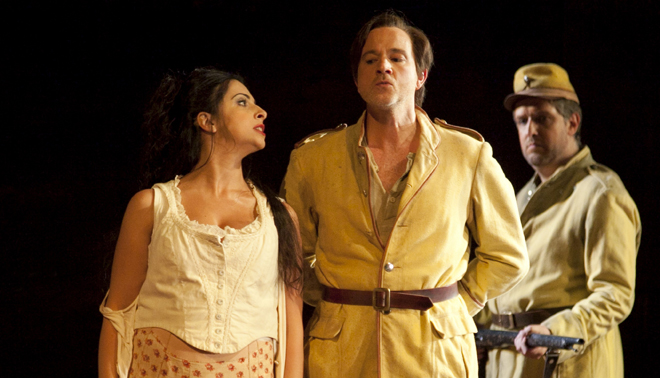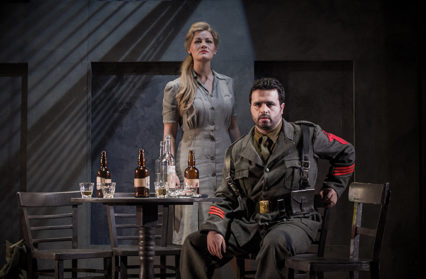Steph Power reviews two performances of Carmen, one of the most performed operas in history, by Mid Wales Opera and Welsh National Opera.
When Carmen was first performed in Paris in 1875, there was little indication that, nearly 140 years later, the opera would have become one of the most beloved and frequently performed in history. Bar the odd supportive comment, initial reception ranged from lukewarm to cold dismissal, and a number of critics voiced outrage at Bizet’s ‘immoral’ gypsy heroine; mezzo-soprano Galli-Marié’s interpretation of the role was ‘the very incarnation of vice’ according to one. Sadly, Bizet died three months later aged just 36 with such phrases ringing in his ears, and so would never have guessed the work’s later triumph – nor the praise to be heaped upon him by figures as seemingly unlikely as Brahms, Richard Strauss and Nietzsche.
Carmen did more than transcend and subvert opéra-comique conventions. Into an intoxicating blend of spectacle, tragedy, comedy, sex and melodrama, Bizet injected a crucial realism which would become key to certain operatic developments to come, notably Italian verismo. The strength of Bizet’s particular cocktail – all realised through a brilliant orchestral score, which weaves Spanish colour into its very fabric rather than as ‘exotic’ add-on – quickly proved irresistible to audiences. And irresistible Carmen has remained – perhaps because of, as much as despite, the various issues of misogyny, racism and class politics that the piece raises in the 21st century.
Of course it is Carmen herself who remains irresistible. The opera is ripe for the kind of feminist exploration that commentators such as Susan McClary have pursued.* On the one hand, Carmen is a titillation for a bourgeois male audience; a woman of unbridled, throaty, knife-wielding, erotic passion – and not just from the working-class, but a flamenco-dancing gypsy ‘other’ to boot – who gets her come-uppance for daring to live contra expectations of female compliance and gentility. But, on the other hand, in her haughty defiance and exposing of societal hypocrisy, Carmen poses a real challenge to a repressive, elitist patriarchy – indeed she is a living mascot for ‘Liberty or Death!’ as Welsh National Opera’s current season theme puts it. On stage, she can be a voyeur’s fantasy or a lodestar for personal and women’s freedom – or ideally, to point the comparison, both aspects at once – depending on the strength and thoughtfulness of the production.
Whatever guise she comes in, Carmen is a guaranteed crowd-pleaser, so the piece is an unsurprising choice for Mid Wales Opera for their 25th anniversary – an impressive milestone to have reached on the meagerest of budgets. But it would take a superb run to justify yet again the reappearance of Welsh National Opera’s 1997 staging by directors Patrice Caurier and Moshe Leiser (revival director Caroline Chaney) – and it is surely not desirable for the companies or their audiences that two Carmens should come along together. But perhaps at least they offer very different readings of the score?…
Well, in Mid Wales Opera’s case, it is the score itself rather than the production per se which offers something different. Composer Stephen McNeff was given the challenging task of re-orchestrating for a chamber ensemble Bizet’s already economical score. His solution is a highly effective one which suggests a very different reading of the opera indeed – a reading which, alas, director Jonathan Miller’s new production glimpses but ultimately fails to grasp. McNeff’s Carmen is recognisably Bizet (via Saint-Saëns and Ravel), but breathes quite another smoky atmosphere: Kurt Weill’s burlesque, ironic cabaret. With guitar and splash cymbal, saxophone and muted trumpet, McNeff opens the door to a rich and intriguing Carmen as direct social critique – and I sincerely hope he finds the director to do it, for Miller is not he by this account. The Mid Wales Opera ensemble did their capable best thanks to tight, forthright direction by Nicholas Cleobury, but the director stops at locating the piece in a grey, working-class pre-Civil War Spain, and eschewing the clichés of gypsy spectacle (he is by no means the first to do either). Beyond that, Miller’s production not only sticks to well-worn gestures, but lacks the fire to make them convincing.

Photo: Robert Workman
Any Carmen has to be sexy, racy and downright ‘out there’ to work. That’s the point – that is who she is and that is why the opera bears her name. How frustrating then, that MWO’s mezzo Helen Sherman should have all the vocal and dramatic hallmarks of an excellent, complex heroine, only to be lumbered with a brooding, sulky Don José in Leonel Pinheiro (who also sounded strained). It’s just not clear what she sees in him, and without chemistry the piece falls flat. José too, should be conflicted; worried about duty and the well-being of his mother (yes, it can all seem very Freudian), his manhood challenged and found acceptable by this voracious creature, only to be scorned in favour of another man, the bullfighter Escamillo (here strongly sung, albeit by a rather gentlemanly Nicholas Lester). Micaëla too, should be the engine of José’s domestic guilt as a homesy foil to Carmen’s brazen wildfire, but, whilst sweetly sung by Elin Pritchard, she seemed adrift in this production.
The highlights – apart from Sherman’s smouldering, gutsy presence – were the ensembles which made the most of a strong but minimal supporting cast of soldiers, smugglers and especially the cigarette factory girls. With such youthful vitality, coupled with McNeff’s score and the witty, doggerel pathos of Rory Bremner’s new translation (MWO perform the work in English), there was a real opportunity here to grasp the nettle of working-class solidarity, ribald banter and yet dog-eat-dog in the face of a very tough life. Alas, this opportunity was missed, albeit that Carmen is seen to be part of a sisterhood rather than standing in her usual proud isolation. But Miller’s gaggle of girls ultimately remains a gaggle of girls, and his bloodless ending proves very far from the crescendo of lethal passions it should be. By having Carmen shot off-stage, he deprives both her and us of the final ironic expression of her physicality: a lifeless body.
In Welsh National Opera’s production, what highlights there were also came from the supporting cast; notably in the form of Jessica Muirhead, who sang a very moving and far from mousy Micaëla. Her impassioned performance provided a much-needed boost for a production that was otherwise lacking in fire and inspiration, and she gave important credence to José’s conflicted longings; here was a steady, but emotionally rich domestic scenario we could believe he might yearn for in less intoxicated moments. However, whilst Peter Wedd’s hapless soldier had his own moments of lithe confidence, there was a distinct lack of chemistry in WNO’s production too.

The problem was not helped by a Carmen who tried too hard. Mezzo Alessandra Volpe certainly looked the part, but lots of skirt swishing and sexy posturing does not equal erotic presence, and the pushing extended to her voice. If we agree with Daniel Albright that Carmen ‘defined a place where melodic intensity and erotic extremity converged’, then there is clearly still work to be done here – although I suspect it would take a fresher production to inspire it. For this staging has been around for as long as Wales has had some measure of devolution – and it shows about the same lack of pioneering excitement as we’ve seen in Welsh politics since. It’s not so much the minimal set and the tobacco-coloured uniforms, but the lack of oomph behind it all. Eschewing spectacle more or less altogether – especially the bullfighter’s procession – is all very well, but it focused too great attention on a stripped-back set in which nothing much happened. Visually, certain props became key, but were literally poorly handled. Volpe, for instance, was distracted by her castanets as she struggled to get them on and off, let alone play them – and a more general point about knives: brandishing one only works if you look like you really could stab somebody as opposed to butter their toast.
Musically, it sounded to me as if the cast and (nonetheless gutsy) chorus had been rehearsed at one set of tempi, only for conductor Erik Nielsen to step in last minute and confuse them with another. Ensemble was often poor, and some sloppy diction from the cast only added to the time lag (WNO perform the piece in French, with spoken dialogue). Structurally too, Nielsen favoured a sectional, stop-start approach which hardly did justice to Bizet’s sharp-edged narrative with its emotional peaks and troughs, and although the players showed their customary élan to salvage the score as only they could, the orchestral balance was often uncertain.
That said, on a more positive note, WNO’s production – like McNeff’s score for MWO – did offer some interesting sight-lines into this fascinating opera. Two of the many provocative questions about Carmen’s character concern the apparently separate – even contradictory – issues of her narcissism and her willingness to die by José’s hand. Often described as a kind of female Don Giovanni, it seems deliberately unclear on Bizet’s part whether she is singing for her lovers, for a general audience or for her own pleasure – which brings us back to a passive victim/strong heroine ambivalence. In the WNO, another layer to the picture is added at the denouement as Carmen is confronted by José whilst her new lover Escamillo (a promisingly strutting Kostas Smoriginas) enters the bullfight arena off stage. When José refuses to let her pass, she lowers her head and butts him in the chest. On this occasion, Volpe’s Carmen lacked the animal aggression to bring the gesture off. Still, the inference was highly suggestive and bears future exploration: for, notwithstanding her gender, it is surely Carmen who is the true wild bull of the piece. At the end, perhaps she simply gives up when it becomes clear that she cannot turn the tables on her fate – which is to be tamed by man in ritualised sexual combat or to die under his blade.
* See for example Susan McClary’s George Bizet: Carmen (Cambridge Opera Handbooks), Cambridge University Press 1992
Mid Wales Opera, Theatr Hafren, September 3 2014
Orchestration: Stephen McNeff
Translation: Rory Bremner
Conductor: Nicholas Cleobury
Director: Jonathan Miller
Cast Includes: Helen Sherman / Leonel Pinheiro / Nicholas Lester / Elin Pritchard
Welsh National Opera, Wales Millennium Centre, September 19 2014
Conductor: Erik Nielsen
Directors: Patrice Caurier and Moshe Leiser
Revival Director: Caroline Chaney
Chorus Master: Alexander Martin
Cast includes: Alessandra Volpe / Peter Wedd / Kostas Smoriginas / Jessica Muirhead












